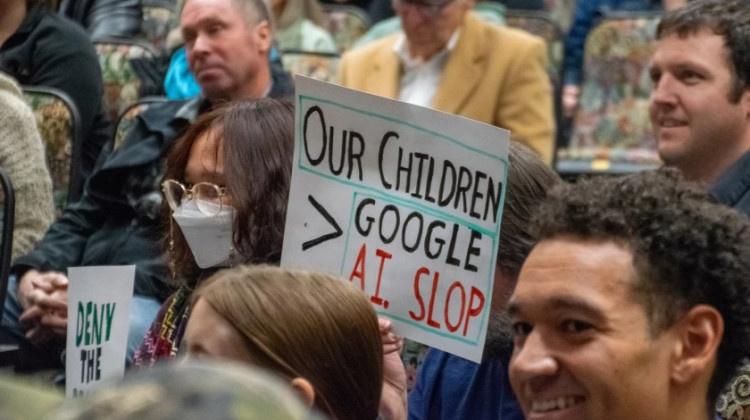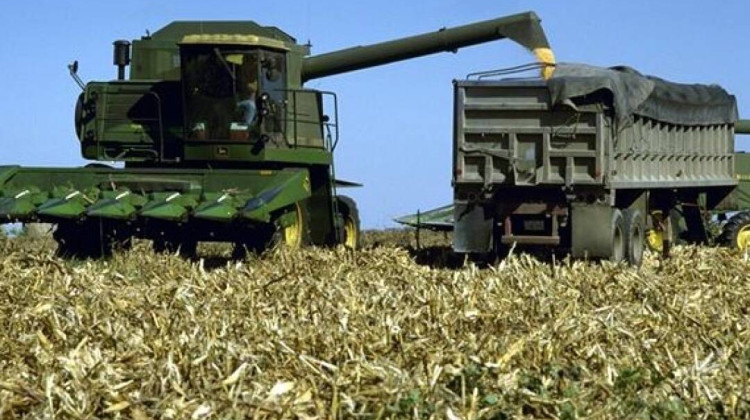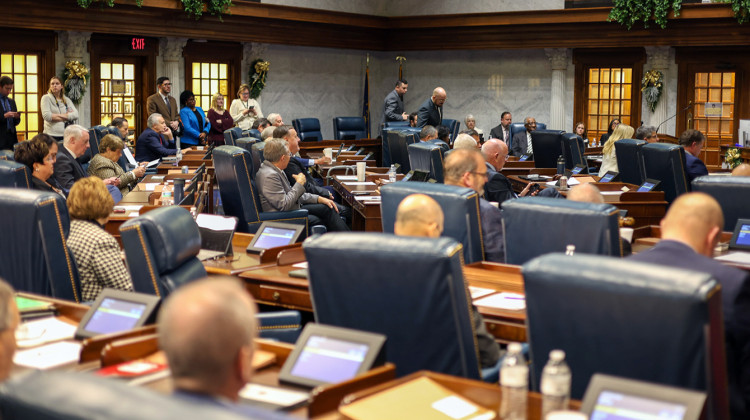The United Nations estimates in order to meet the world’s increasing demand for food, farmers will have to boost production 60 percent by 2050.
Agriculture experts say part of the solution is using technology that promises to boost yields without increasing the amount of land or fertilizer farmers have to use.
Biotech company Monsanto is launching one of those technologies in Indiana this year; and while it’s eliciting excitement about the possibilities it presents, farmers are also expressing concern about the amount of private data it requires them to share.
A Different Way of Farming
The overcast skies on a recent weekday in Leesburg, Ind. make it hard for farmer Kip Tom to read the information on his iPad. But these small inconveniences are nothing compared to the benefits he says he receives from the new technology he’s using.
"Before we always thought to produce more we had to buy a bigger tractor or put on more fertilizer," Tom said. "This is a different way of farming. We’re farming smart. We’re protecting the environment, we’re being more effective with the resources we have. It is the wave of the future."
More often, that future is taking the form of big data programs like Monsanto’s Fieldscripts.
To use Fieldscripts, farmers like Tom partner with a Monsanto representative. Then, using data tools, satellite mapping technology and iPads, they gather photos , soil samples and previous yield estimates from the various parts of their fields and send that data to Monsanto. The company analyzes the information and sends back recommendations on how farmers can improve their crop yields.
As Tom picks up a handful of soil and then lets it run through his fingers, he explains how Monsanto’s recommendation have improved his soil — and increased his yields as much as 18 bushels per acre — which would be roughly a 30 percent increase for an average acre of corn.
"One of the things we saw is we were applying too much fertilizer," Tom said. "If we got it at the right places at the right time in the right amount, there was increased productivity."
Tom has been using Fieldscripts for the past five years—he was part of Monsanto’s pilot program to test the product before it went on the market. Now, Monsanto is making Fieldscripts available across the state.
Privacy Concerns
Many farmers say before they adopt the new technology they need to learn more about it. Top of mind for a lot of folks is privacy.
At a recent Indiana Farm Bureau conference focused on big data, farmers are voicing some of their concerns. Brookston farmer John Erickson says he still has a lot of unanswered questions.
"Technology is changing so fast sometimes we don’t keep up with everything," Erickson said. "I came to this today to see what we should be aware of when we sign that agreement."
Michelle Kaiser Bray is an attorney at Faegre Baker Daniels who spoke at the Farm Bureau Conference.
"There’s business data. There could be personal information. What is being collected? Who’s collecting it? Who controls the data," Bray said. "Is it being shared with just service providers and affiliates or are there folks who are interested in using the data for marketing purposes? These are the kinds of questions farmers are asking, and rightfully so.”
Bray says, additional safeguards are needed as the agriculture industry enters into a new era of data technology and there are efforts underway to create more oversight.
The Farm Bureau, for example, has considered whether to push for federal legislation establishing data privacy rules in agriculture, and Monsanto recently connected itself to an open data initiative that aims to develop industry standards on how farmers’ information can be used.
Earning Trust
Back at Tom’s farms, Kip Tom goes over his farming data with Kurt Calvert, the Fort Wayne District sales manager with the Monsanto seed company Asgrow. Calvert has been working with Tom and other farmers to implement Fieldscripts — and he says it isn’t always an easy process getting farmers on board.
"Growers are all over the map. Some will jump in right away. Others, it takes some convincing and showing them the data, which is how it should be," Calvert said. "Honestly, we need to prove ourselves. We need to prove our value first and foremost and then prove that we can be trusted with the growers’ data."
That proof can’t come quickly enough. In addition to Indiana, Monsanto is rolling out Fieldscripts in Illinois, Iowa and Minnesota this year before taking the program nationwide. And Monsanto isn’t the only one with big data programs. Other companies including DuPont Pioneer and John Deere are developing data technologies — all aimed at increasing yields.
 DONATE
DONATE







 View More Articles
View More Articles

 Support WFYI. We can't do it without you.
Support WFYI. We can't do it without you.